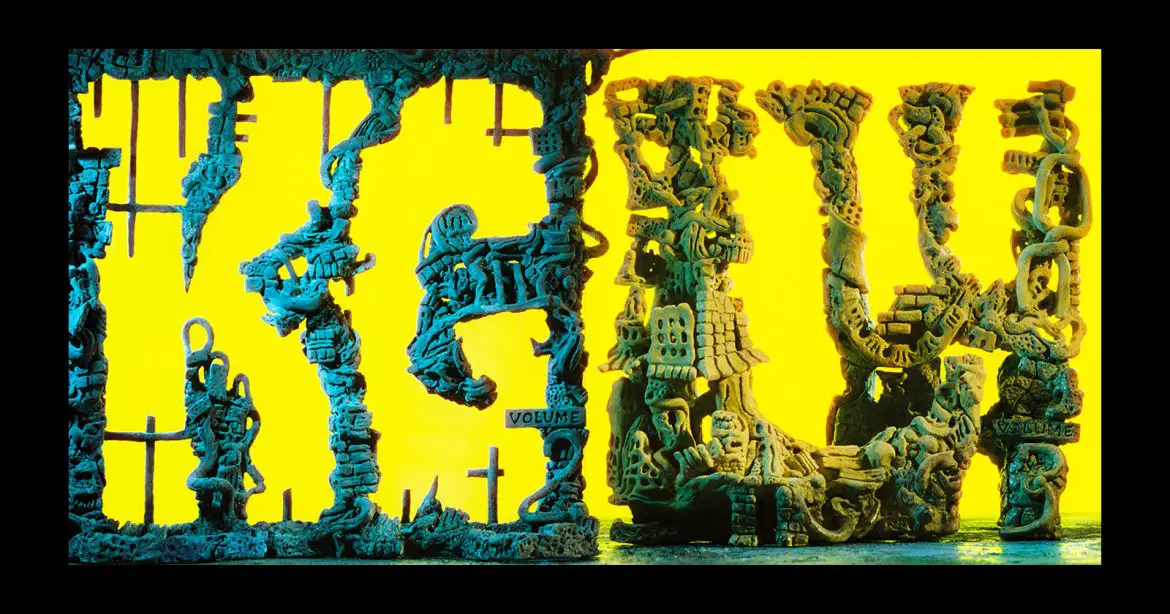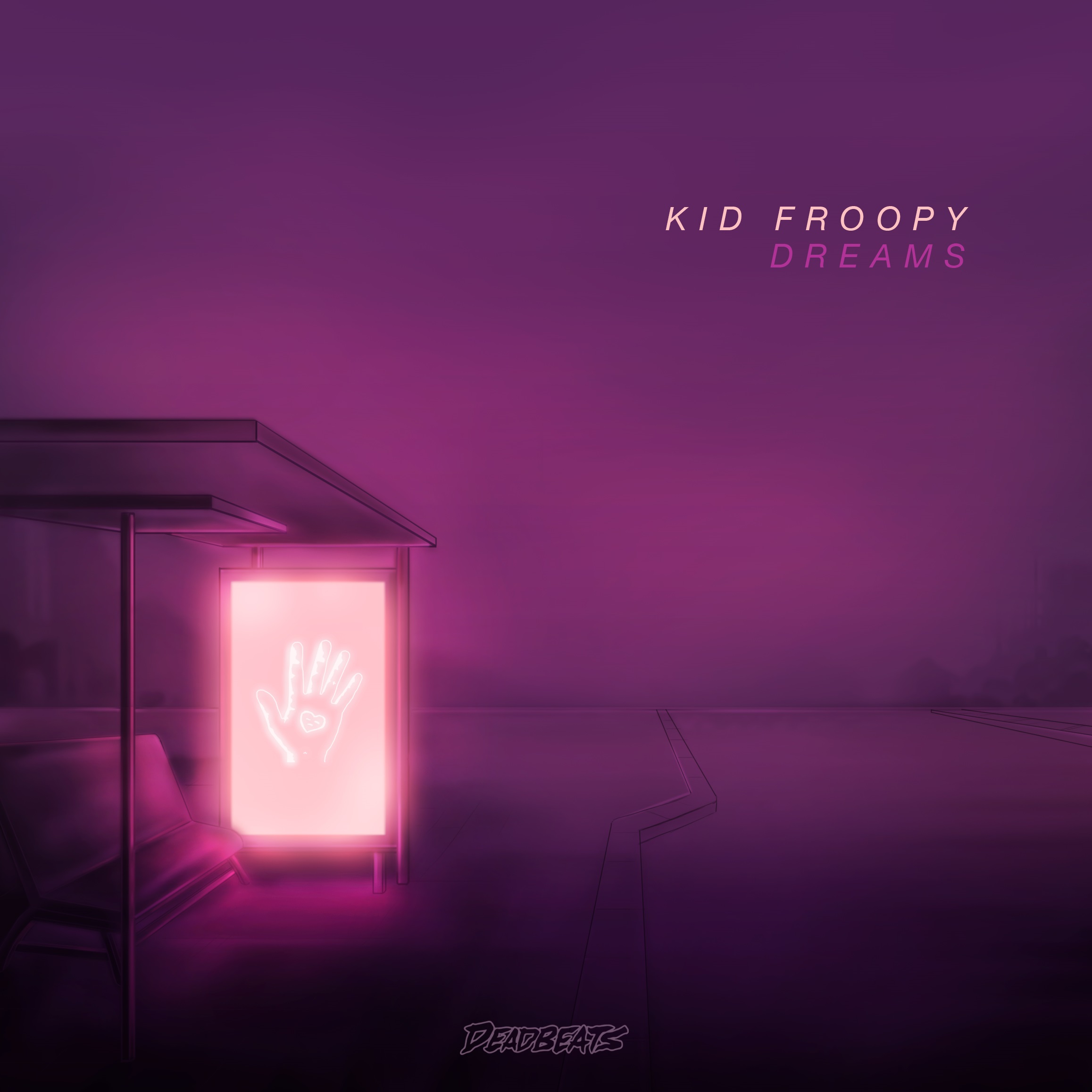King Gizzard and The Lizard Wizard meld their progressive garage rock with the Anatolian, Egyptian, and Indian rock influences together to craft the titanic double album effort ‘K.G.L.W.’
Stream: ‘L.W.’ – King Gizzard & The Lizard Wizard
“I used to dream about killing certain people/Dreams that sew me up like sleeping with a needle/Those feelings that I had are building up to something/I feel a schism in the rhythm, now I’m running.” – “Intrasport”
It all depends on the context for K.G. and L.W.
Alone, one outdoes the other. But together, these twin efforts constitute one of King Gizzard and the Lizard Wizard’s most important records.
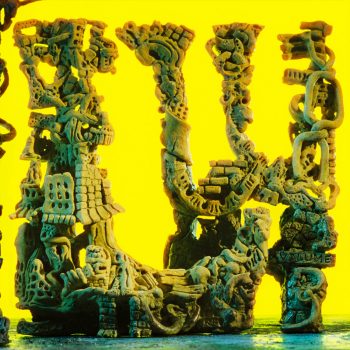
Sixteen and seventeen in number, but second and third volumes in nature, K.G.L.W. comprises the follow-up to their first volume Flying Microtonal Banana and further ties these two records to a particular section of the Gizzverse: microtonality. The titanic implementation of Arabic and Turkic scales (which have smaller tonal intervals than Greek scales, hence the name) might merit the criticism that King Gizzard have begun to “sound the same,” but it would be a shallow critique, devoid of context. Sameness develops from a career-long trajectory; for most artists, they tend to find a frequency and then stay there. Microtonality, however, would not begin to describe this outfit’s work. Out of seventeen studio records in ten years, only five have touched on this particular fusion and only three have done so explicitly with focus. The collective have frequently detoured from this sonic, with a four-year lacuna between Volumes I and II.
The rule of each new record was to provide an answer to the question “what will they do next?” Each another shard of glass fractured from their overarching cosmology of lightning lords, people-vultures, auto-asphyxiating automatons, a next chapter in the serialized entropy that has come to define their lyrics and binds together their disparate sounds and explorations. But K.G.L.W. provides the exception; it combines a great deal of their sonic, not just their themes. A thematic critique of this triptych would merit an entire treatise separate from this review and there is an endowed argument based on this double album alone which reveals not only what the band does, but how they want to be known.
A double long-player is, by nature, a work meant to cement a band in theme and/or musical tradition. When asking into which the double album fits, one could joke “yes.” K.G.L.W. is a tome myriad in theme and tradition; an effort to fuse Turkish, Arabic, and Indian modes to King Gizzard and the Lizard Wizard’s expression of progressive, psychedelic, garage rock, all written in sloe.
And by sloe I mean the toxic yellows, greens, and turquoise of detritus piled pêle-mêle and presaging the long-player’s initials, K.G. and L.W.—or simply K.G.L.W.—in mockings of rubble and ruin. The covers of both K.G. and L.W. leave little to imagine where Stu MacKenzie and company see the world as it stands. The clay is fired to brick, twisted to wood, and cast to iron, rendered into Delphic ruins. There is no more meat to this culture, barely even bone. Where Infest the Rat’s Nest reaped a macabre metal populism, depicting the poor parachuting from Hell to Mars to kill the cowardly rich, K.G.L.W. makes mirth of today’s Earth.

People know the story: the world’s ending. So what to do while their ecosystem slowly crumbles? For the three primary wordsmiths, they set up a rain barrel—vanity, mass narcissism, disassociation, bloodsport, basic philosophy, life on the road, straws in the wind all dominate the first long-player; pandemics, sexual abuse scandals, doom scrolling, artificial intelligence and lethargic disaster responses sprawl across the second. Stu MacKenzie decries manmade catastrophe, Joey Walker details psychology and Ambrose Kenny-Smith highlights moral hypocrisy. The grand arc is a paralysis of political, social, and personal magnitude stalking two discs, hedged by two readings of the eponymous, Arabesque “K.G.L.W” and lanced through by MacKenzie’s immortal “WOO!”
This does not mean the whole project is flawless. Of the two records, K.G. features more stalls in momentum and weaker singles. Along the record’s runtime “Some Of Us” and “Oddlife” dampen the record’s inertia and removing chances for the album to blaze off in a blinding run of hit-after-hit. Of the promotionals, only “Honey” and “Intrasport” qualified as top-tier slices while model garage rock and sludge metal cuts such as “Minimum Brain Size,” “Ontology,” and “The Hungry Wolf of Fate” were relegated to album-oriented experiences.
Like a wind on sail, I’ll steer you along
And the germs outside I’ll keep you from
Like the hail in the morn, I’ll sing you a song
While the mead I make can brew for you.
– Honey
The aforementioned “Honey” still shines as the strongest single release and the one most true to purpose: an acoustic hit with great weaving lyrics of love unadulterated and intricate fretwork, the song holds up as a remedial breather between the main sequence and album finisher. To the inquiring new listener, it is an excellent introductory single whereas “Some of Us” and “Straws in the Wind” played out more idiosyncratic artistic choices. The latter does have a defense, however: it’s fucking bonkers. With vocals and harmonica from Kenny-Smith, sitar from Craig, and an attachment of McKenzie’s flute to the harmonica, the piece coagulates into a chimerical being and deliberates on the futility of straws in the wind.
The great sin of these two singles is that they cloud some of the brightest backlog cuts. One brilliancy is Michael Cavanagh’s confirmation as the once and future drummer for the collective. His absolutely vicious drumwork for “The Hungry Wolf of Fate” provokes whiplash to end all whiplash as a viable instrumental tool.
Watch: “If Not Not Now, Then When?” – King Gizzard and The Lizard Wizard
Another is the emergence of Joey Walker as a songwriting force. “Minimum Brain Size” codifies their progressive garage rock sound, binding a Turkish bağlama with microtonal electric guitars while laying down a lyric tombstone on toxic masculinity and tears refusing amends with the eye. Walker’s skill as a songsmith has seen success in small doses before, but this double album might just prove him as a premiere composer.
Yet no brilliance can hold a candle to the supernova that is “Intrasport,” Walker’s second addition to the album and tale of Saturday night fights sings feverish with slick Hotline Miami carnage, kicks pumped up and all. Here he combines wah-wah pedals with Anatolian changes, twinkling keyboards, and more cowbell summoned from an Elektron Digitrakt. Links to a “Crumbling Castle” appear in its segue, “Oddlife,” but weary feet dance in the deserted dunes of this cut.
For a band so skilled and meticulously planned behind the scenes, however, K.G. sounds more pressed for material than any of their 2017 records. Without its second half, the first disc transfigures into a more refined, goal-oriented Gumboot Soup. Certainly not recommended alone, but neither disparaged, just less satisfying. A time capsule or a love letter—pick the metaphor—K.G. plays succinct, a catchall of microtonal postdates and diverging setpieces punctuated with future tidings and then sliced haphazardly at the end as to render most critique woeful and incomplete. In the context of a double album, weaker cuts and sudden exits become ambiance builders and maintainers as each piece less affects the ultimate trajectory of the record.
When the blue sky turns to black
When Gaia hangs by a thread
When all the people die
If not now, then when?
– If Not Not Now, Then When?
Upon the arrival L.W., half-draft essays and jigsaw compositions are achieved. Where K.G. was content to fuck around with this microtonal work, L.W. is ready to find out; ready to find out how funk, microtonal, Anatolian, acoustic, and stoner metal could all fit together in a single package. It completes a difficult task, synthesizing these elements into a signature sound. The overwhelming emotional pall over the second record is a coming to terms with the doom of civilization, a theme that has become more prevalent since shrouding the sonic of Volume I.
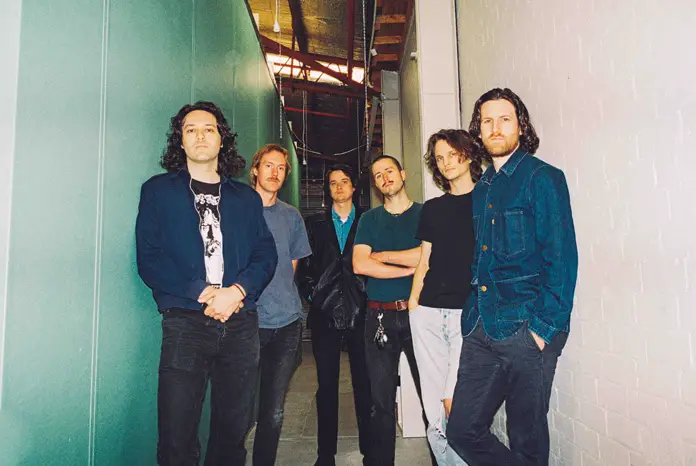
“Pleura,” a denunciation of Coronavirus denial, takes its name from the tissue which cushions the lungs and merges the band’s apocalyptic fantasy with the terrible reality; Stu MacKenzie’s introductions to a Lord of Lung Slaughter, the “Orange One” and a mysterious necromancer showcases evil profiting from negligence. The image of society falling apart is reinforced with Jenga towers, parasitic lust, and an orange child in colic throes. At the end of the cut, the myopic narrator hollers for the submission of the other, proclaiming the destructive limits of their own philosophy as they declare “I EXERCISE MY RIGHT TO DIE.”
The song’s genius does not end just at the lyrics, Michael Cavanagh reintroduces himself on the cut; Atwood colleague Daniel Vagnoni and I both had a go at figuring out the time signature. The melodic blasts left me in awe for every eight beats, losing count each measure. Vagnoni came out with two four-count measures, one at 7/4 and another at 8/4. Lucas Skinner’s stop-and-go bassline hits between each of Cavanagh’s stuttering fills, crafting a rhythm section at once technical and groovy—potent mix of Nonagon Infinity and Polygondwanaland securing melodic success.
Suck the life from what you love
I learn that from the orange one
No one to answer to after the fall
Necromancer will dance on us all
– Pleura
Criticism is not just contained to political figures, but religious organizations, too. On “Supreme Ascendancy,” Kenny-Smith’s opprobrium insinuates cassocks, tax-free monopolies, and the holy hands of God in admonishment of the Catholic and Anglican clergies’ subversion of justice. The cut opens with a keyboard like a koto and a sitar floating somewhere in the background before featuring wild, wrathful organs and xylophones like church bells clashing.
“Ataraxia” furnishes Walker’s strongest composition on the second record, detailing a search for inner peace—the polar opposite of the dissociative “Intrasport”—in the face of crises pertaining to body-image, hypochondria, self-worth, and personal progress. Bassist Lucas Skinner provides a damn fine bassline to Walker’s noodling guitar, leading to an all-stop instrumental break at the three-minute mark. Walker’s main guitar riff is left to glide before Skinner rejoins it in a swell. The finishing piece, a zurna dervish in the back of the mix, leaves me in a dilemma, I can’t decide if I love “Minimum Brain Size,” “Intrasport,” or “Ataraxia” more.
Watch: “Pleura” – King Gizzard and The Lizard Wizard
L.W. also continues to incorporate more tricks from sludge, thrash, and doom metal. From playing in minor key, mangling microphones, doubling up rhythm and bass, to clanging the motherfucking anvil, the collective members are finding ways to rival the Black Sabbaths, Melvins, Megadeths, and Iron Maidens of old. The album descends to animal savagery as it reaches the final word. The last glimmer of hope in those marimbas from “See Me” can only hope to fade to the tooth and claw of “K.G.L.W.”
As a single record, L.W. is more successful than K.G. The songs fit better and the last instants of “K.G.L.W.” ring with more finality by design. As a double album, they are unmatched by anything else in this band’s discography. The experiments settle from permutation into pure apotheosis as the second disc more than makes up for the flaws of the first. It floats the entire project and makes it a fully achieved project, completing the setlist but also bringing the cycle to a close.
Untouchable, lying through your teeth
Break the doctrine, they’re all laughing
Double-parking tax-free control monopoly
So complacent, it’s adjacent to the demons you summon from your faculty
– Supreme Ascendancy
At this point, no other band can really claim the mantle of best self-produced rock act besides Kevin Parker or John Dwyer. And even that’s maybe as Kevin Parker left much of psychedelic rock behind with The Slow Rush. King Gizzard & the Lizard Wizard are at their worst, unfocused and with attention span in deficit. Yet when they focus—when they really focus—on a project there is no band greater in rock and roll today. Not even Thee Oh Sees.
Everything from the selection of the instruments to the compositional forms to the layering of sonic is important. In that regard, there are plenty of instruments that lose themselves in the mix. It becomes a case of instrumentation and objective; while it could not be all ragas and dervishes all the time, the sitar, in particular, becomes a fiendish trick to separate from the microtonal guitarwork. Only their wicked zurna is readily distinguishable. Still, moments permit for disco-rock, lo-fi funk, folk-rock, stoner metal—and whatever the hell “Straws in the Wind” might constitute—all fuse together with Turkish and Indian scales in a double album dervish.
Watch: “Intrasport” – King Gizzard and The Lizard Wizard
Moreover, the amount of well-curated, contemporary lyrics across this double project, and just across L.W. alone, is astonishing. From admonishments on power, sarcastic harangues on plastic straws, vignettes of mental disturbia, to cycles of the endless road, they are a band on fire, presenting their varied thoughts pertaining to the peeling facade of life in the new century, immortal woos included. I cannot state this enough: not many bands do this. Most popular rock is kept to psychological or interpersonal narratives to keep them relatable. King Gizzard’s career showcases a different way—what is more relatable than existential dread and anger at the powers-that-be?
It was always difficult to identify which album best displayed the essence of King Gizzard and the Lizard Wizard. At best one might suggest something that displayed their interests: be it progressive, garage, psychedelic, Anatolian, folk, or jazz-rock. Beforehand I might have documented Nonagon Infinity or Polygondwanaland as their essential listening or keystone long-players to understand the premier tenants of their music. I still do, but the pair only defines the group’s progressive garage rock and jazz-informed metal sonics, respectively. They incur a canonical significance akin to Led Zeppelin II or Zoso. The towers of power sharpened into taut forty-something minute runtimes, the former a bluesy metal blueprint, the latter the classic rock album.
K.G.L.W., however, is “the big one.” The largest roller coaster in the theme park. If you fail to ride it once, did you really even visit? It’s a long, up-and-down affair circling the sum total of nearly all King Gizzard and the Lizard Wizard’s constituent parts. Nonagon Infinity and Polygondwanaland are mind and body, K.G.L.W. is the soul. Their Physical Graffiti, their Electric Ladyland, their Wall, their Exile on Main Street, their Layla and Other Assorted Love Songs, their Wheels of Fire, their Eat a Peach, their Sandinista!, their Disintegration, their Tago Mago, their White Album.
Where Flying Microtonal Banana commenced, so K.G.L.W. concludes:
K-G-L-W
When the claws come out
Cage me too
I’m an animal too
Woo!
– K.G.L.W
— — — —
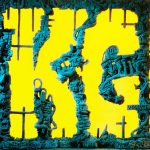
Connect to King Gizzard & The Lizard Wizard on
Facebook, Twitter, Instagram
Discover new music on Atwood Magazine
? © 2021
K.G.
an album by King Gizzard & The Lizard Wizard
L.W.
an album by King Gizzard & The Lizard Wizard

